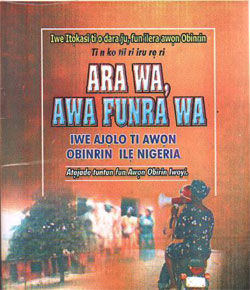Midlife and Menopause
In Translation: Menopause in Other Cultures
The "In Translation" sidebars in the 2011 edition of Our Bodies, Ourselves highlight the work of our global partners who develop health resources based on Our Bodies, Ourselves for their own communities.
.jpg) |
 |
| Group: Sanlaap (India) and Manavi (USA )
Country: India
Resource: “Aamaar Shaastha, Aamaar
Sattaa” (My Health, My Self), a Bengali
booklet based on Our Bodies, Ourselves
Websites: sanlaapindia.org;
manavi.org
|
Group: Women for Empowerment,
Development, and Gender Reform
(WEDGR)
Country: Nigeria
Resources: Print and nonprint materials
based on Our Bodies, Ourselves in pidgin
English and Yoruba |
“The effects of menopause on the sexual, reproductive health and lives of women [have] been our major work,” says OBOS’s partner in Nigeria, Women for Empowerment, Development, and Gender Reform (WEDGR).
In Nigeria, a primary goal of marriage is to have children. Women who do not have children are often blamed for infertility and ostracized by family and community. This attitude, which stems largely from a lack of information, also applies to postmenopausal women, who are no longer able to become pregnant.
In a survey conducted by WEDGR, 85 percent of men who did not have children and whose wives were approaching or in postmenopause freely admitted to having sex with other women with the intent to reproduce. The men were unaware that infertility can be ascribed to both men and women or that menopause is part of every woman’s life cycle. After adapting and translating content from Our Bodies, Ourselves into pidgin English and Yoruba, WEDGR used the materials to te the community about the social and biological impact of menopause and the health implications of unprotected sex. As a result of this outreach, there is a growing awareness of menopause as a natural stage, rather than a problem or taboo.
In comparison, OBOS’s partner in India, Sanlaap, a feminist nongovernmental organization, reports that though gender segregation and restricted mobility are the norm for women throughout their childbearing years, women past menopause actually gain power and status within the family and society. This power is increased if they have given birth to sons. Older women are allowed more freedom to interact with men. They are often seen as matriarchs and wise advisers in their families. In the rural contexts of West Bengal, a state on the eastern coast, older women often play the roles of arbiters and negotiators to resolve conflicts within and between families.
Excerpted from the 2011 edition of Our Bodies, Ourselves. © 2011, Boston Women's Health Book Collective. You can read other "In Translation" sidebars about women's groups who are adapting Our Bodies, Ourselves and creating resources to advance the health and human rights of women and girls in their countries. To read more about Sanlaap and Manavi, click here. To read more about WEDGR, click here.
< Return to Midlife and Menopause Overview
|




